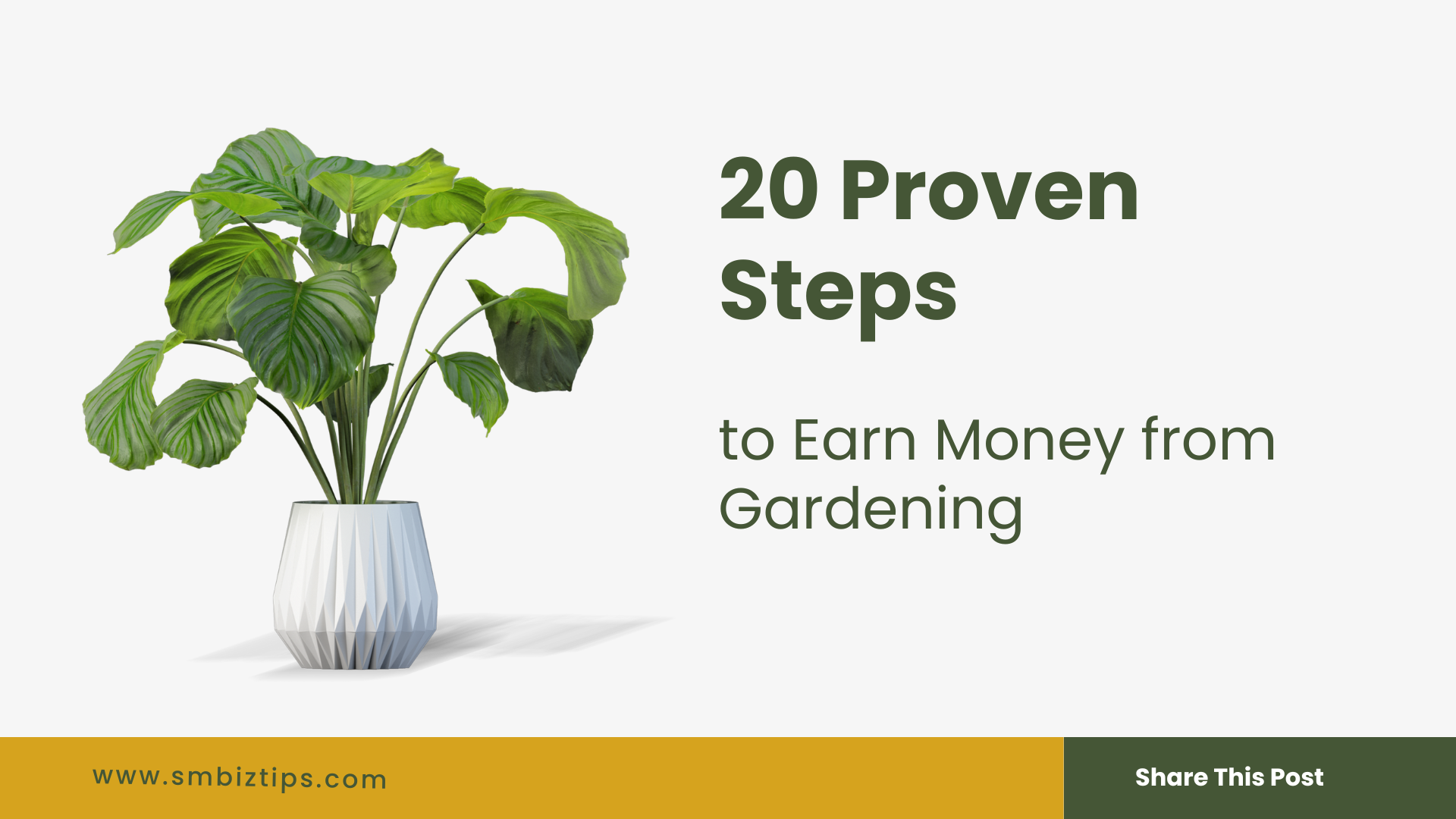Earn Money from Gardening
More than a hobby, gardening can be profitable. With the increasing interest in sustainable living and organic produce, there’s a growing market for garden-based products and services. This guide outlines 20 proven steps to help you turn your passion for gardening into a profitable venture.
1. Learn about the market.
To succeed in any business, you need to understand the market. Research your local demand for garden produce and services. Identify market gaps in which you can offer unique products. Examine what your competitors are offering as well as their pricing strategies. This knowledge will help you position your business effectively and attract customers.
2. Choose Your Niche
Specializing in a particular type of gardening can help you stand out. Consider focusing on organic vegetables, herbs, flowers, or even exotic plants or medicinal herbs. Evaluate the potential profitability of each niche. Choosing a niche allows you to target specific customer groups and tailor your marketing efforts.
3. Create a business plan.
A well-thought-out business plan is essential. Outline your business goals, target market, and revenue streams. Include a detailed financial plan covering start-up costs, pricing, and expected earnings. Consider potential risks and how to mitigate them. A solid business plan will guide your decisions and attract potential investors.
Must Read : Time Management Techniques for a Small Business Owner
4. Start small and scale up.
Begin with a manageable garden size and gradually expand as you gain experience. Test different plants and products to see what grows best and sells well in your area. Reinvent your strategies based on initial success and feedback. Starting small reduces risk and allows you to refine your processes.
5. Invest in quality tools and supplies.
High-quality tools and supplies improve efficiency and yield better results. Purchase durable gardening tools, use organic fertilizers, and implement pest control methods that enhance produce quality. Consider long-term sustainable practices to reduce costs. Investing in quality equipment pays off over time.
6. Build a greenhouse.
A greenhouse extends the growing season and protects plants from harsh weather. It allows you to grow exotic or out-of-season plants, attracting more customers. For higher yields, optimize space utilization. A greenhouse can significantly boost your production capacity and variety.
7. Utilize vertical gardening.
Vertical gardening maximizes space, especially in urban areas where space is limited. Grow plants vertically using trellises, wall planters, or vertical garden systems. This method increases the variety of produce you can grow and sell, enhancing your profitability.
8. Sell at local farmers’ markets
Farmers’ markets are excellent venues to engage directly with customers. Build relationships, offer samples, and educate customers about your gardening methods. Take advantage of community events to increase visibility. Farmers’ markets provide a platform to showcase your products and gain loyal customers.
9. Offer subscription boxes.
Subscription boxes are a popular trend. Provide customers with weekly or monthly boxes of fresh produce, including recipes and tips on how to use the produce. This model builds a loyal customer base with consistent quality. It ensures regular income and customer retention.
10. Create value-added products.
Increase your revenue by making and selling value-added products like jams, pickles, and dried herbs. Offer DIY kits for customers to grow their own herbs or vegetables. Explore possibilities for branded merchandise. Value-added products diversify your offerings and appeal to a broader market.
11. Start a gardening blog or YouTube channel.
Share your gardening knowledge and experiences online. Monetize through ads, sponsorships, and affiliate marketing. Build a community of followers who are potential customers. A blog or YouTube channel can generate additional income and promote your gardening business.
12. Host gardening workshops and classes.
Teach others about gardening techniques and benefits. Charge a fee for in-person or online classes. Partner with local schools or community centers to reach a broader audience. Workshops and classes establish you as an expert and create additional revenue streams.
13. Offer landscaping services.
Use your gardening skills to design and maintain gardens for others. Specialize in organic and sustainable landscaping. Your target audience includes homeowners, businesses, and public spaces. Landscaping services are in high demand and can be highly profitable.
14. Create a seed bank.
Collect and sell heirloom or rare seeds. Educate customers on the importance of seed preservation. To build a community, offer seed exchange programs. A seed bank adds a unique aspect to your business and attracts gardening enthusiasts.
15. Utilize social media marketing.
Showcase your garden and products on social media platforms like Instagram and Facebook. Engage with followers through regular posts and live videos. Use targeted ads to reach potential customers in your area. Social media marketing increases visibility and customer engagement.
16. Partner with local businesses
Deliver fresh produce to local restaurants and cafes. Collaborate with local stores to sell your products. Network with other local entrepreneurs for mutual benefits. Partnerships with local businesses expand your market reach and create steady demand.
Must Read : Top Future Business Ideas for Women in 2024
17. Join gardening associations and clubs.
Join gardening associations and clubs to stay up-to-date on the latest trends and techniques. Attend workshops, conferences, and trade shows. Engage in networking activities with fellow gardeners and prospective clients. Associations and clubs provide valuable resources and connections.
18. Create an online store.
Sell your products online to reach a wider audience. Use e-commerce platforms like Etsy or Shopify. Offer delivery services or local pick-up options. An online store expands your customer base and increases sales opportunities.
19. Provide gardening consultation services.
Provide expert advice to other gardeners and businesses. Help design, plan, and troubleshoot gardens. Charge by the hour or offer packaged consulting services. Consultancy services position you as an expert and generate additional income.
20. Apply for grants and subsidies.
Investigate the grants that are available for small agricultural businesses. Apply for subsidies that support sustainable and organic farming. Use the funds to expand and improve your gardening business. Grants and subsidies provide financial support to enhance your operations.
FAQ
1. How much initial investment is required to start a gardening business?
The initial investment can vary widely depending on the scale of your operation and the niche you choose. For a small home garden, you might need a few hundred dollars for basic tools, seeds, and supplies. For a more extensive setup, including a greenhouse and advanced equipment, the costs can run into thousands of dollars.
2. Can I start a gardening business with limited space?
Yes, you can. Many successful gardening businesses operate in small urban spaces using techniques like vertical gardening, container gardening, and hydroponics. The key is to maximize the use of available space.
3. Do I need any special permits or licenses to sell garden produce?
This depends on your location and the scale of your business. Check with your local authorities for regulations on selling produce. You might need a business license, permits for selling at farmers’ markets, or certifications for organic produce.
4. How do I find customers for my gardening products?
Start by selling to friends and family, then expand through local farmers’ markets, online platforms, and social media. Building a website or a blog can also attract customers. Networking with local businesses and joining gardening clubs can further expand your customer base.
5. What crops are the most profitable for small-scale gardening?
High-value crops like herbs (basil, mint), microgreens, specialty vegetables (heirloom tomatoes, gourmet mushrooms), and flowers can be very profitable. Profitability depends on local demand, so research what sells well in your area.
6. How can I ensure my garden is sustainable and eco-friendly?
Use organic farming practices, such as composting, crop rotation, and natural pest control. Collect rainwater for irrigation and use energy-efficient tools. Implementing these practices not only benefits the environment but also attracts eco-conscious customers.
7. What are some common challenges to starting a gardening business?
Common challenges include dealing with pests and diseases, unpredictable weather, fluctuating market demand, and managing labor. Proper planning, ongoing education, and networking with other gardeners can help you overcome these challenges.
8. How long does it take to start making a profit?
The time to profitability can vary. Some small garden businesses may start seeing profits within the first year, while others, especially larger operations, might take a few years to become profitable. Consistent quality, effective marketing, and efficient operations can accelerate this process.
9. Is it possible to run a gardening business part-time?
Yes, many gardeners start their businesses part-time. This allows you to test the waters and gradually build your business without the financial pressure of relying on it as your sole source of income. As your business grows, you can transition to full-time work.
10. How can I market my gardening business effectively?
Utilize social media platforms to showcase your garden and products. Participate in local farmers’ markets and community events. Build a website or blog to attract online customers. Offering workshops and engaging with local schools or businesses can also help to increase your visibility.
Conclusion
Earning money from gardening is a rewarding endeavor that requires passion, knowledge, and strategic planning. By following these 20 proven steps and addressing common questions, you can transform your garden into a profitable business. Remember, the key to success lies in continuously learning, adapting, and connecting with your community. Happy gardening!

